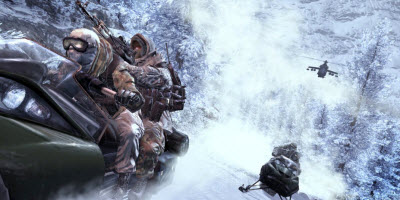
Rumors of a shake-up hit the web and Twitter. And Activision Blizzard confirmed the turmoil on Monday in a filing with the Securities and Exchange Commission. The filing said the company was conducting a human resources investigation into “breaches of contract and insubordination by two senior employees at Infinity Ward.”
[aditude-amp id="flyingcarpet" targeting='{"env":"staging","page_type":"article","post_id":164430,"post_type":"story","post_chan":"none","tags":null,"ai":false,"category":"none","all_categories":"business,","session":"C"}']One of the employees is Jason West, chief technology officer of Infinity Ward. The other is reportedly Vince Zampella, head of the studio and a co-founder. Last year, Infinity Ward co-founder Grant Collier, long the front man for the media, also left the studio. (It’s not exactly clear what Collier is doing). Sources say both West and Zampella have not shown up at the studio in recent days.
Activision Blizzard said it does not believe the departures and possible litigation will have a material effect on the company’s revenues. But that seems like a cynical statement. We’re talking about the makers of Modern Warfare 2, the best-selling video game of all time.
AI Weekly
The must-read newsletter for AI and Big Data industry written by Khari Johnson, Kyle Wiggers, and Seth Colaner.
Included with VentureBeat Insider and VentureBeat VIP memberships.
Activision Blizzard has long had a practice of splitting the development of its Call of Duty games between two different game studios, almost as a hedge against problems like these departures. Infinity Ward makes the Modern Warfare games, while Treyarch has been making the Call of Duty World at War games. Activision Blizzard can argue that its creative talent is replaceable, particularly on a well-known franchise like Modern Warfare, but the departure of studio chiefs often leads to the formation of new startups that sucks out remaining employees. It will be interesting to see what happens.
Collier and crew were part of 22 former employees who left 2015 Studios, an Oklahoma company — maker of the Vietnam war game Men of Valor — to start Infinity Ward in 2002. They created the hit game Call of Duty in 2003. It was a hit because, like Medal of Honor: Allied Assault before it, it took gamers and put them in the middle of hellish firefights that were inspired by great war movies like Saving Private Ryan. Activision bought Infinity Ward on the cheap in 2003. The popularity of the franchise snowballed, and then it hit new heights with the release of a modern combat game, Call of Duty 4: Modern Warfare, released in 2007.
West said on his Facebook page update that, “Jason West is drinking. Also, unemployed.” What could have triggered this problem? The actual situation isn’t clear. But it’s easy to think that one of the key problems was compensation. Infinity Ward’s acquisition money got plowed back into development. And so the billion-dollars plus that has filled Activision Blizzard’s coffers has probably created tension. The game’s creators probably feel like they should get a bigger share of profits, while the parent company does not. It was noteworthy that Bobby Kotick, chief executive of Activision Blizzard, said at the recent Dice Summit that game developers should “check their egos at the door” at the company because “it takes a village” to create a great game. He also said that Activision Blizzard is a good Mother Ship when it comes to providing resources to its game studios, leaving them alone, and fostering great game development.
Infinity Ward is one of Activision Blizzard’s greatest achievements in that regard. All I can say is that the company better not blow it. I’m a big fan of the Modern Warfare series, and, like other gamers out there, I expect to see a new version come out every other year. Interestingly, we asked Activision Blizzard if Zampella could join a discussion at GamesBeat@GDC, our executive game conference coming March 10, about Building a Blockbuster Franchise. The PR guy never responded. One of the lessons, of course, is that you should never kill the golden goose. The other is you should never let success go to your head.
VentureBeat's mission is to be a digital town square for technical decision-makers to gain knowledge about transformative enterprise technology and transact. Learn More
